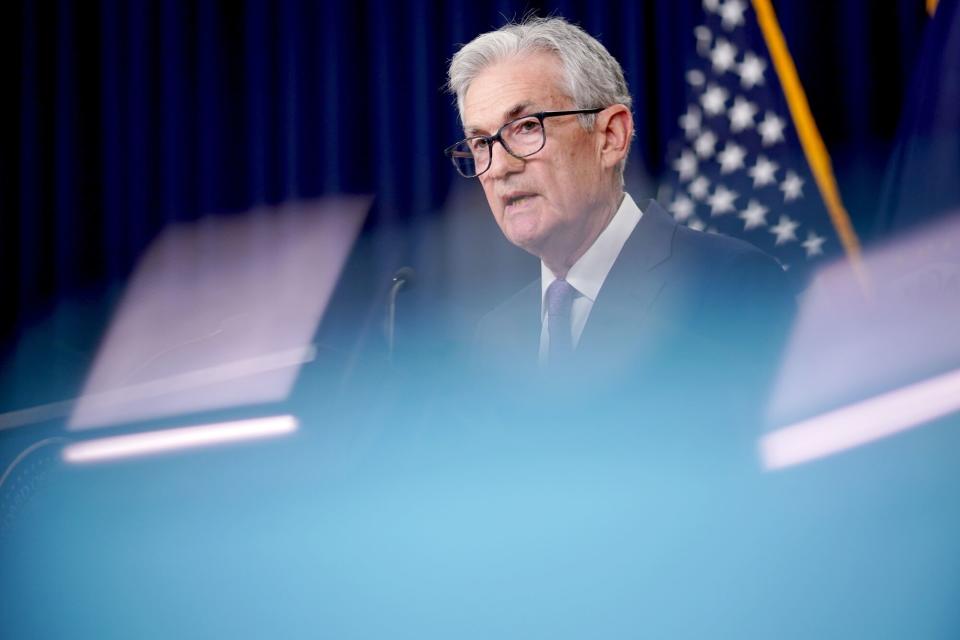Powell Welcomes Recent Data But Fed Needs More Confidence to Cut
(Bloomberg) -- Federal Reserve Chair Jerome Powell said the latest economic data suggest inflation is getting back on a downward path, but emphasized officials need more evidence before lowering interest rates.
Most Read from Bloomberg
Democrats Weigh Mid-July Vote to Formally Tap Biden as Nominee
US Allies Allege China Is Developing Attack Drones for Russia
S&P 500 Closes Above 5,500 in Record-Breaking Run: Markets Wrap
While Powell declined to give any specific guidance on the timing of the first rate reduction, he did acknowledge the Fed has made “quite a bit of progress” in reducing inflation. The Fed chief added he’d like to see that progress continue.
“Because the US economy is strong and the labor market is strong, we have the ability to take our time and get this right,” Powell said during a panel Tuesday at the European Central Bank Forum on Central Banking in Sintra, Portugal. “And that’s what we’re planning to do.”
When Powell was asked what keeps him up at night, he pointed to the delicate balance between taming inflation and avoiding a significant deterioration in the labor market.
“It’s very much understood by us that we have two-sided risks, and we have to manage them,” Powell said during the panel with ECB President Christine Lagarde and Brazil’s central bank chief Roberto Campos Neto.
After a lack of further progress toward the central bank’s goal in the first few months of 2024, data out last week painted a more promising picture. The Fed’s preferred measure of underlying inflation rose just 0.1% in May, marking the smallest advance in six months.
But some Fed officials have begun to elevate the labor market as a point of concern. Hiring has also cooled, and the unemployment rate — while still historically low at 4% — has edged higher in recent months.
Inflection Point
San Francisco Fed President Mary Daly said last week that the job market is nearing an inflection point, where further slowing could lead to rising joblessness. Powell expressed a similar sentiment, noting the US is getting to the place where further declines in job openings have traditionally meant higher unemployment.
“He is telling us they are nervous” about the labor market, said Priya Misra, a managing director at J.P. Morgan Asset Management. “They have seen the slowing and they don’t want it to accelerate. They are getting vigilant.”
US central bankers have held their policy rate in a target range of 5.25% to 5.5% — a more than two-decade high — since last July.
The last reading on inflation, and to a lesser extent the one before it, “suggest that we’re getting back on a disinflationary path,” Powell said. “What we’d like to see is more data like what we’ve been seeing recently.”
US Treasury yields veered lower as Powell began speaking, though an unexpected rise in job openings has since helped to pare the earlier decline. Traders in the swaps market continued to price in almost two rate cuts for this year.
The US economy has been remarkably resilient amid high borrowing costs, but there are signs restrictive Fed policy is having an impact. Along with a broader cooling in labor demand, home sales have slowed, delinquencies on credit cards and auto loans have risen and consumer spending has moderated.
Global Picture
Other central banks around the world have already begun to lower interest rates, including the ECB and Bank of Canada. Lagarde emphasized in comments Monday, however, that the central bank doesn’t yet have sufficient evidence the threat of inflation has passed.
Brazil began lowering rates almost a year ago, though the central bank held borrowing costs steady at its meeting last month.
With fiscal uncertainties and concerns about the bank’s tolerance for inflation in the years ahead weighing on domestic assets and price expectations, Brazil’s Campos Neto stressed inflation will converge back to the country’s 3% goal.
“What the markets price in today is not in sync with the reality,” he said Tuesday. Traders cut back on rate hike bets after his remarks.
--With assistance from Will Kubzansky, Sydney Maki, Maria Eloisa Capurro, Amara Omeokwe and Matthew Boesler.
(Updates throughout with additional comments from Powell, Campos Neto.)
Most Read from Bloomberg Businessweek
China’s Investment Bankers Join the Communist Party as Morale (and Paychecks) Shrink
The Fried Chicken Sandwich Wars Are More Cutthroat Than Ever Before
For Tesla, a Smaller Drop in Sales Is Something to Celebrate
Japan’s Tiny Kei-Trucks Have a Cult Following in the US, and Some States Are Pushing Back
©2024 Bloomberg L.P.

 Yahoo Finance
Yahoo Finance 

